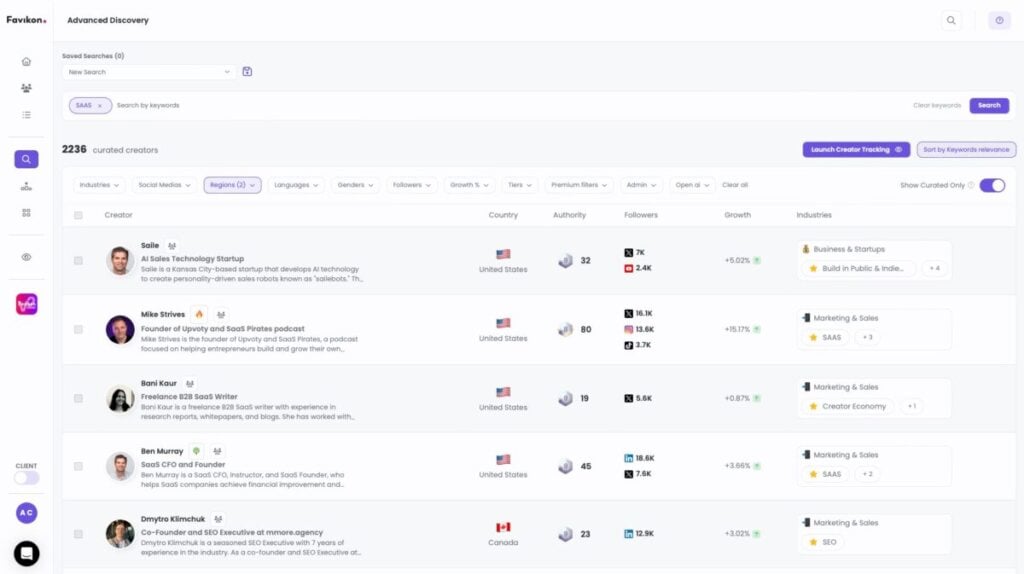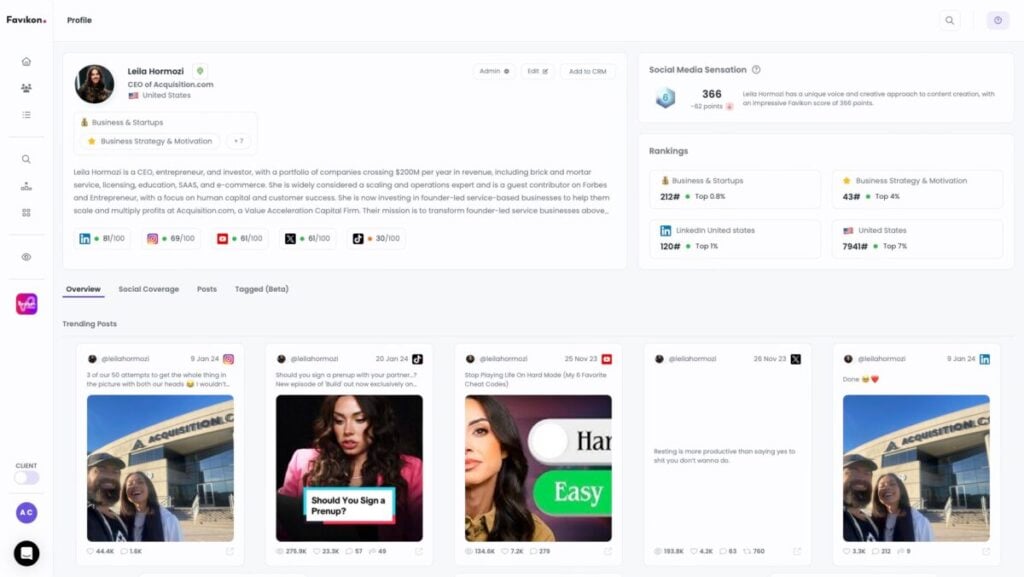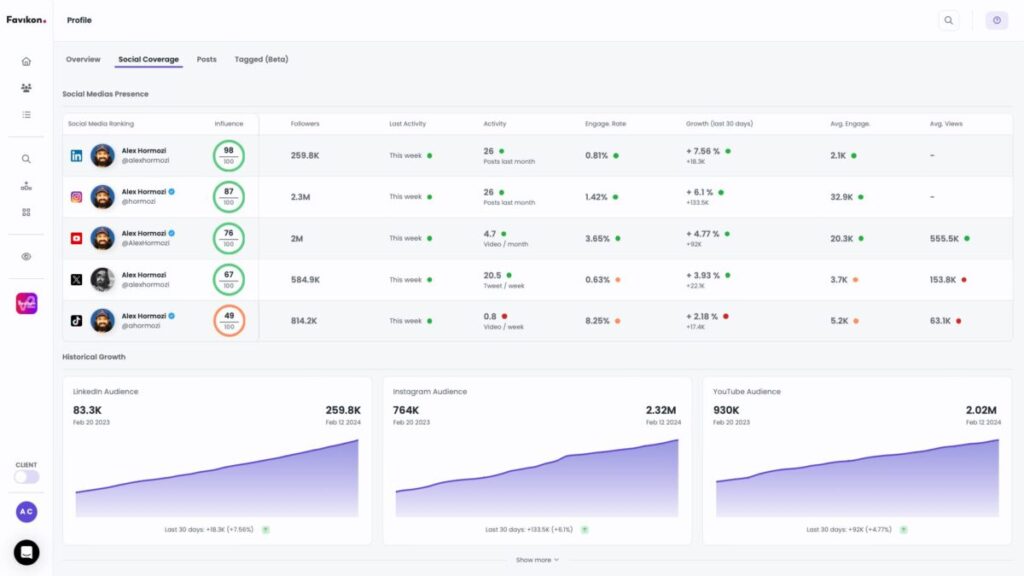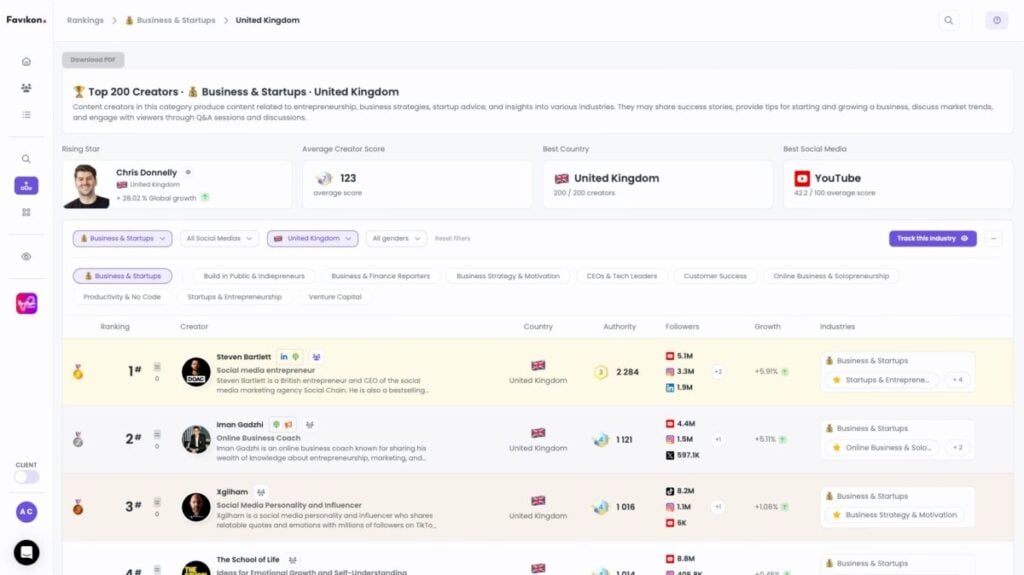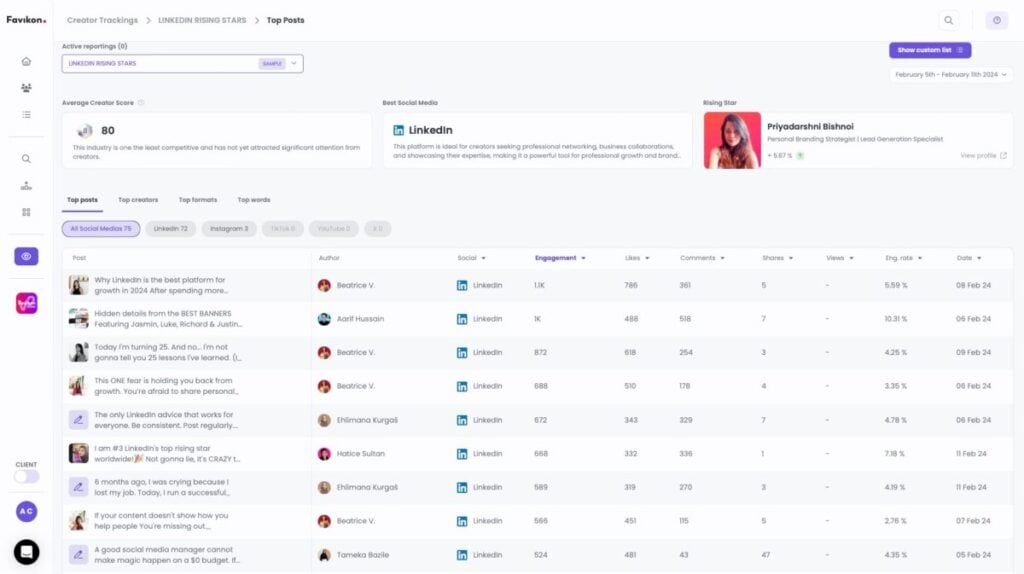
When we first took a look at Favikon a few years ago, Jeremy Boissinot, one of its founders, was very adamant in pointing out that his company offers an influencer marketing “tool”—not a platform. This word choice isn’t meant to downplay its capabilities so much as it is to highlight them. Whereas a platform is as it sounds—a foundation upon which all your influencer activities are propped up—and includes many different tools, Favikon is more focused in its use. This doesn’t mean it’s a one-trick pony, though.
Favikon sets its sights on influencers, content, data, and business intelligence, very much positioning itself as a tool to use before you start launching campaigns and tracking results. Over the last couple of years, Boissonot & company have seen how influencer marketing has grown and evolved and they’ve made sure Favikon has kept pace with the changes. One way they’ve done this is by leaning into AI to create more context for what was already an impressive range of analytics.
That AI goes beyond simply giving insights to help you make it easier to decide on creators that are a good fit for your brand. This is where some Favikon has really fleshed out its tools even more: language learning models, the base tech underlying today’s AI, might be the most advanced pattern recognition machines ever invented. This makes it a no-brainer to use for things like spotting social media trends, ranking influencers, and getting industry insights—all of which are now part of the Favikon offering.
Add to these capabilities a well-executed IRM designed to nurture the relationships you’ve cultivated with influencers, along with plans priced to appeal to a wide range of companies, and it’s clear why Favikon has more than 10k users, a mix of brands and agencies. It’s powerful software without trying to do too much. There are any number of campaign management and end-to-end platforms available that can do more than what Favikon can, but there aren’t too many of them that can do it as well as they do.
Summary:
Pricing
Favikon offers four levels of subscription, with even its most expensive level of service being incredibly affordable. They also offer one of the most aggressive incentives for paying on an annual basis, working out to nearly 50% off the monthly price.
- Free, 0€/mo - This gets you access to the influencer CRM for up to 20 influencers, essentially a major improvement over spreadsheet management to get you interested in the rest of the platform.
- Starter, 99€/mo (49€/mo, if billed annually) - CRM for up to 100 creators, 50 search credits for AI search, unlimited profiles, 5 rankings, 1 list for creator tracking (50 creators max), and access to the private creator community.
- Pro, 159€/mo (79€/mo, if billed annually) - CRM for up to 1,000 creators, 500 search credits, unlimited profiles, 50 rankings, 5 lists, access to private creator community and VIP events
- Business, 449€/mo (249€/mo, if billed annually) - CRM for up to 5,000 creators, unlimited search, profiles, and rankings, 50 lists, private community access and VIP events
The Details
The throughline between the different functions of Favikon boils down to its data, and the AI engine underlying it somehow places a more human face on it. What do we mean by this? In a word: context. Numbers don’t exist in a vacuum but analytics tools often present them as if they were, and it’s left to the user to put everything into a proper context. But with Favikon, that context is everywhere.
A good example is with its influencer discovery module. It works in ways that are familiar: You can enter a keyword or phrase, and then filter down by different criteria to narrow your results. Searching like this can often be just as much about finding the right combination of words and filters as it is about finding the right results. With Favikon’s discovery tool, you’ll have a much easier time by browsing through its categories—though the word “niche” seems more appropriate here. There are more than 750 niches indexed within the database, courtesy of an AI that’s analyzing creators and their content (including things like blogs and podcasts), assigning them into an appropriate category, and getting really specific about it.
If you’re a food brand, you can start by clicking through to Food & Nutrition, where you’ll get a list of all creators active in that category. Those influencers are also given an authority score—based on a number of factors—that gives you a fairly clear measure of their influence in that category. We say “fairly clear,” because there’s no scale, like “from 1 to 100.” This is a good thing, because really, how can you quantify a thing like influence? You can, on the other hand, quantify audience reactions to content—which is the foundation for these authority scores. The bigger the number the better, allowing you to make quick inferences about a creator when comparing her to others in the same category. If one creator has a score of 1500, and the other 700, you know which one has the bigger pull with their audience.
In any case, that was a lot of words to say that Favikon’s made it a breeze to find relevant influencers. It takes more time to read that explanation in the last paragraph than it would for you to browse down from a general category (Food and Nutrition) to a more niche one (Gut Health) and find the most influential creators within it. Using these niche lists as your starting point for a search, you can then do the keyword/filter thing if you want, but really it just makes sense to start diving deeper into the profiles of those with higher authority scores.
The profiles are another place where you can see how the AI humanizes the experience, all while providing you with an absolute ton of data. One of the cooler things available here is the plain language bio offered along with a breakdown of their various social media scores. The bio itself gives background and context you wouldn’t get from just looking at a creator’s content, and the social media scores are an additional measurement quantifying their prowess on each channel. Unlike the authority score, these numbers can standalone and actually are on a scale of 1 to 100. This abundance of info is handy: someone might have a high overall authority, but here you can make sure to leverage that authority on the channel where it will have the biggest impact.
Creator profiles go even deeper: you’ll see any and all categories they might be appropriate for, a listing of their trending posts across all channels, and even more rankings that get into geography, as well as channels and categories. Head into the “Social Coverage” section of their profile, and you get even more data: All the old standbys are here, like performance metrics, audience growth trends, the rate at which they post, and graphs to visualize anything. Because Favikon’s AI is getting its data from more sources than just social media, the profile can also clue you in to anywhere else they’ve appeared, like on podcasts.
Any creators that you work with or want to track/monitor can be added to the CRM, though to call it a CRM is a little of a stretch. It’s really more of a database of creators, presented as a list that looks just like what you see in the discovery module. You can see their data, and channels, authority score, etc in all the columns to the right of each of their names. You can track and monitor their content, too. But there’s really nothing here to help you manage the relationship (the “RM” in “CRM”) beyond adding more tags to further categorize them, or add them into more specialized lists (which is a more useful feature than the CRM, with its ability to aggregate the data for all creators in that list).
Elsewhere on the platform are loads of other rankings and reports that can be used for all kinds of business intelligence. Competitive research, trend analysis, understanding the audiences—all of these can be accomplished with the trove of data contained within Favikon.
Conclusion
Favikon’s latest version is a progression from where it started years ago, and the progress has been impressive. They were already highly rated by us, both for the depth of the data it provided and the ease of use—all at a very low price. The good news is that they’ve kept all these selling points, and just built on it to make a tool that can work as a standalone discovery engine, or to supplement other, more end-to-end platforms.
The one criticism we can level at it is the CRM, but only because it’s not really a CRM. If they called it something different, it would draw the attention away from what it doesn’t do. As it is, it’s a nice way to organize the creators you find using a data-rich discovery tool to get the deepest possible understanding of them. It’s enterprise level business intelligence with a price tag that will appeal to even the smallest of brands.
Favikon
-
Features
-
Ease of Use
-
Reporting

